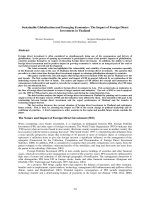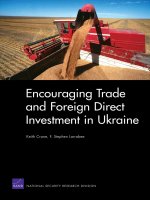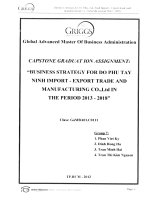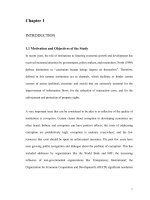crane k., larrabee, f. s. encouraging trade and foreign direct investments in ukraine. 2007
Bạn đang xem bản rút gọn của tài liệu. Xem và tải ngay bản đầy đủ của tài liệu tại đây (848.39 KB, 63 trang )
Prepared for the
Institute of European and International Studies in Kyiv
NATIONAL SECURITY RESEARCH DIVISION
Keith Crane, F. Stephen Larrabee
Encouraging Trade
and Foreign Direct
Investment in Ukraine
The RAND Corporation is a nonprofit research organization providing
objective analysis and effective solutions that address the challenges
facing the public and private sectors around the world. RAND’s
publications do not necessarily reflect the opinions of its research clients
and sponsors.
R
®
is a registered trademark.
© Copyright 2007 RAND Corporation
All rights reserved. No part of this book may be reproduced in any
form by any electronic or mechanical means (including photocopying,
recording, or information storage and retrieval) without permission in
writing from RAND.
Published 2007 by the RAND Corporation
1776 Main Street, P.O. Box 2138, Santa Monica, CA 90407-2138
1200 South Hayes Street, Arlington, VA 22202-5050
4570 Fifth Avenue, Suite 600, Pittsburgh, PA 15213-2665
RAND URL: />To order RAND documents or to obtain additional information, contact
Distribution Services: Telephone: (310) 451-7002;
Fax: (310) 451-6915; Email:
Library of Congress Cataloging-in-Publication Data is available for this publication.
ISBN 978-0-8330-4216-3
Cover Design by Stephen Bloodsworth
The research described in this report was sponsored by the Institute
of European and International Studies in Kyiv. It was conducted in
the International Security and Defense Policy Center of the RAND
National Security Research Division (NSRD). NSRD conducts research
and analysis for the Office of the Secretary of Defense, the Joint
Staff, the Unified Combatant Commands, the defense agencies, the
Department of the Navy, the Marine Corps, the U.S. Coast Guard, the
U.S. Intelligence Community, allied foreign governments, and U.S. and
foreign foundations.
iii
Preface
is monograph presents an analysis of the current environment for
foreign trade and investment in Ukraine and a set of policy propos-
als that would serve to expand foreign trade and attract more foreign
direct investment in Ukraine, especially with respect to the United
States.
e project was sponsored by the Institute of European and
International Studies in Kyiv. It was conducted within the Interna-
tional Security and Defense Policy Center of the RAND Corpora-
tion’s National Security Research Division (NSRD). NSRD conducts
research and analysis for the Office of the Secretary of Defense, the
Joint Staff, the Unified Combatant Commands, the defense agen-
cies, the Department of the Navy, the Marine Corps, the U.S. Coast
Guard, the U.S. Intelligence Community, allied foreign governments,
and U.S. and foreign foundations.
For more information on RAND’s International Security and
Defense Policy Center, contact the Director, James Dobbins. He can
be reached by email at ; by phone at 703-413-1100,
extension 5134; or by mail at the RAND Corporation, 1200 South
Hayes Street, Arlington, VA 22202-5050. More information about
RAND is available at www.rand.org.
v
Contents
Preface iii
Figures
vii
Summary
ix
Acknowledgments
xv
CHAPTER ONE
Introduction 1
Missed Opportunities
2
Why Foster Foreign Trade or Seek Foreign Direct Investment?
2
Ukraine Has Been Slow to Foster Trade or Seek Foreign Direct
Investment
4
Research Approach
5
Organization of is Monograph
6
CHAPTER TWO
Foreign Trade, Foreign Direct Investment, and the Ukrainian
Economy
9
Ukrainian Economic Growth: e Record
9
Ukraine’s Foreign Trade
13
Evolution and Principal Trading Partners
13
Trade with the United States
15
Foreign Direct Investment in Ukraine
16
CHAPTER THREE
Barriers to Trade and Foreign Direct Investment in Ukraine 21
Corruption
21
vi Encouraging Trade and Foreign Direct Investment in Ukraine
Barriers to Trade 23
Ukraine Is Not Yet a Member of the World Trade Organization
23
Difficulties in Obtaining Refunds for Value-Added Tax
24
Certification and Standards
25
Embargoes
27
Export Taxes
28
Barriers to Foreign Direct Investment
28
Complicated Regulatory and Legal Environment
28
Availability of Land and Premises
29
Inconsistencies in Commercial Law
31
Deficiencies in Laws on Joint Stock Companies
31
Privatization
32
Energy
33
CHAPTER FOUR
Recommendations for Improving the Climate for Trade and Foreign
Direct Investment in Ukraine
35
Reducing Corruption
35
Fostering Trade
36
Attracting Foreign Direct Investment
40
Setting Priorities and Sequencing
43
Immediate Priorities, to Be Implemented Within 100 Days
43
Longer-Term Priorities
43
References
45
vii
Figures
2.1 Ukraine’s GDP, 1989–2007 10
2.2
Per Capita GDP for Selected Former Soviet Republics,
2006
12
2.3
Ukraine’s Exports, 1994–2006
13
2.4
Ukraine’s Exports, by Region and Country, 2006
14
2.5
Ukraine’s Imports, by Region and Country, 2006
15
2.6
Ukraine’s Trade with the United States, 1996–2006
16
2.7
Cumulative Foreign Direct Investment in Ukraine and
Hungary
17
2.8
Cumulative Foreign Direct Investment in Ukraine, by
Country of Origin, 2006
18
2.9
Foreign Direct Investment in Ukraine, by Country of
Origin, 2001–2006
19
ix
Summary
Ukrainian governments have found it singularly difficult to liberal-
ize trade and improve the climate for foreign direct investment (FDI),
ostensibly two of Ukraine’s economic policy priorities. Trade and FDI
have greatly contributed to economic growth and increases in standards
of living throughout the world, especially in Central Europe. However,
in contrast to Central Europe, Ukraine has been slow to open its bor-
ders to trade and has had difficulty attracting sizable inflows of FDI. As
a result, Ukraine has suffered economically: Its standards of living are
currently far below those in Central Europe, Russia, and Kazakhstan.
Barriers to Trade and Foreign Direct Investment in
Ukraine
Corruption
Corruption, petty and grand, constitutes the single greatest barrier to
expanding trade and investment in Ukraine. Grand corruption involves
high-level officials with discretionary authority over government policy,
the sale of government assets, or large government contracts. Petty cor-
ruption involves lower-level officials who make decisions about enforc-
ing (or not enforcing) regulations.
Foreign businesses complain most vociferously about Ukrainian regu-
latory and legal hurdles designed to elicit bribes. As in most countries
afflicted by corruption, Ukrainian government employees, in hopes
of eliciting bribes, deliberately design licensing and registration proce-
dures to be so complex that they may credibly threaten to halt or slow
x Encouraging Trade and Foreign Direct Investment in Ukraine
trade or a foreign investment. As a consequence, the time and expense
of obtaining the requisite permits and licenses to trade or to set up
and open a business add substantially to costs, reducing both trade
and investment. Rigged privatizations also impede foreign investment.
Ukraine’s contradictory laws and corrupt judges make it difficult for
businesses to enforce contracts, which also discourages investment.
Barriers to Trade
e most immediate problem facing Ukraine is that it is not yet a member
of the World Trade Organization (WTO) despite support for this step
from all major political parties. Because Ukraine is not a member of the
WTO, Ukrainian firms face discriminatory treatment in most of their
export markets. Exporters and importers in Ukraine confront arbi-
trary changes in domestic policies because the Ukrainian government
is unconstrained by treaty obligations.
e most severe impediment to exports in Ukraine is the corruption
embedded in the system for providing rebates to exporters for value-added
tax (VAT). Government employees encourage companies seeking VAT
refunds to hire local law or consulting firms that charge a “fee” of 25 to
30 percent of the refund to expedite reimbursements. Companies that
hire these firms have their VAT reimbursed promptly; companies that
do not, wait three to 18 months for reimbursement. Smaller companies
sometimes receive no refunds at all.
e greatest barrier for importers is Ukraine’s complex, corrupt system
of certifying imports. e accepted international practice is for import-
ing countries to recognize products certified by accredited bodies in
partner states with internationally recognized accreditation procedures
as acceptable. In Ukraine, all products subject to mandatory certifica-
tion—which constitute a very long list—have to be recertified, sub-
stantially increasing importers’ costs.
Nothing has undermined Ukraine’s reputation as a responsible trad-
ing partner more than the embargoes imposed on grain exports in 2006
and 2007. ese embargoes were instigated by Ukrainian commercial
interests tied to the government that hoped to obtain export quotas and
resell them to legitimate grain exporters, pocketing substantial sums
in the process. is policy caused legitimate grain exporters to lose
Summary xi
upwards of $200 million. Additionally, it will have a lasting, depress-
ing effect on the incomes of Ukrainian farmers given that international
grain trading companies now shun the Ukrainian market because of
the risks of export embargoes and quotas.
Barriers to Foreign Direct Investment
Potential investors have great difficulty obtaining satisfactory sites in
Ukraine. Potential investors cannot obtain the land they need to build
distribution centers and factories. Retailers and restaurateurs complain
that municipal governments sell or lease all the best commercial sites to
favored individuals. Problems in obtaining titles, construction permits,
and operating permits add to costs and complexity.
A number of provisions in the 2004 Commercial (or Economic) Code
contradict existing provisions in the more market-oriented, Civil Code.
Businesses find that activities mandated by one of these codes some-
times violate provisions of the other. Some Ukrainian businesses exploit
these legal discrepancies by selecting the laws they find preferable for
their current operations. If disputes arise, they choose courts that favor
their choice of applicable laws or judges who are willing to be bribed
to do so.
Because of deficiencies in the laws pertaining to joint stock compa-
nies, shareholders lack key rights of ownership. Majority shareholders
can use the legal system and a friendly court to issue new shares and
steal assets. Minority shareholders (“raiders”) have used current laws
to deprive majority shareholders of their rights and, in a few instances,
control of their company.
In contrast to the governments of Central Europe, Ukrainian govern-
ments have not extensively used privatization to attract foreign capital and
business expertise. With the exception of a very few transparent sales of
major assets, privatization has resulted in formerly state-owned enter-
prises being acquired by Ukrainian businessmen or foreign companies
controlled by Ukrainians. In most instances, Ukrainian businessmen
have effectively excluded foreign investors by usurping the privatiza-
tion process.
Current laws and policies, ostensibly designed to make it possible for
foreigners to invest in Ukraine’s energy sector, effectively discourage most
xii Encouraging Trade and Foreign Direct Investment in Ukraine
potential investors. ose companies that have invested in Ukraine’s
energy sector have experienced difficulties with Ukrainian regulators.
Some decisions have been in violation of the law or based on extraordi-
narily narrow interpretations of regulations.
Recommendations for Improving the Climate for Trade
and Foreign Direct Investment in Ukraine
e Ukrainian government should adopt a two-pronged strategy to remove
the worst of these impediments to trade and investment. First, the govern-
ment should focus on making a few highly visible policy changes that
promise results within 100 days. Second, the government should set in
motion changes in Ukraine’s institutions that will, with time, reduce
corruption and other impediments to trade and investment. Several
recommendations whose adoption would reduce the most egregious
barriers to trade and FDI are provided below. We have classified them
according to whether they are expected to bring results within 100
days or over a longer period.
Corruption
Within the next 100 days, the Ukrainian government should do the
following to reduce opportunities for government employees to manip-
ulate the regulatory system in order to solicit bribes:
Set up a network of regional boards to which businesses and citi-
zens can appeal administrative decisions. e boards should be
composed of civil servants, businessmen, and citizens, and should
have the authority to stay decisions taken by lower-level civil ser-
vants until they can be reviewed by higher-level administrators or
administrative courts. All board meetings should be open to the
public.
Give Inspector Generals the authority to immediately put govern-
ment employees facing credible accusations of soliciting bribes on
administrative leave and to then quickly bring cases to court for
resolution.
•
•
Summary xiii
Hold supervisors responsible for the behavior of their employees,
and reprimand or dismiss supervisors whose employees have been
convicted of corruption.
Fostering Trade
Joining the WTO is the most important near-term step that the Ukrainian
government can take to spur trade. If bilateral negotiations fail to resolve
issues with current WTO members that threaten to block Ukraine’s
entry, the Ukrainian government should turn to the secretariat of the
WTO, the U.S. government, or the European Commission for assis-
tance in resolving these issues.
e Ukrainian government will need to maintain an inter-
ministerial working group with the clout to prevent laws or regula-
tions being made that violate Ukraine’s agreements with the WTO.
e Ukrainian government should give the Department on Cooperation
with the WTO full authority to ensure that Ukrainian legislation and
regulations remain in compliance with the WTO.
e Ukrainian government should promptly reimburse exporters
for VAT payments. Regulations should be issued stipulating that VAT
reimbursement requests be processed in accordance with the law (that
is, within 60 days). Supervisors should be penalized if the regulations
are not followed.
Ukraine should immediately accept all products that conform to
European Union (EU) standards. Once a product is certified by the EU,
no further certification should be necessary in Ukraine.
e Ukrainian government should immediately eliminate all remain-
ing embargoes on grains. It should pass legislation conforming to WTO
practices that strictly defines when export quotas on agricultural prod-
ucts may be imposed and how they will be allocated.
Attracting Foreign Direct Investment
e Ukrainian government should set legal limits on the ability of govern-
ment employees to impede the establishment of businesses in Ukraine. e
government should
Set fixed deadlines for action on permits.
•
•
xiv Encouraging Trade and Foreign Direct Investment in Ukraine
Set a yearly limit on the number of inspections to which a busi-
ness will be subject.
Ensure that initiatives for one-stop registrations and permits are
operating by January 1, 2008.
e Ukrainian government should ensure that its decision to repeal
the ban on agricultural land sales goes into effect on January 1, 2008.
e Ukrainian government should immediately abolish the Com-
mercial Code and appoint a task force to revise the Civil Code. e task
force should be composed of representatives from the judiciary, govern-
ment agencies, the legal profession, businesses, and consumer groups.
It should provide draft legislation or regulations to fix laws affecting
Ukrainian businesses that are contradictory, poorly written, or lacking.
It should also appoint a small team of senior government officials to
spearhead efforts to make the necessary legislative changes.
e Ukrainian government should replace its current privatization
strategy with a new one that is geared toward rapid, transparent privati-
zation of almost all the commercial assets it still owns. e government
should create a revised list of companies to be privatized and an accel-
erated time schedule for privatization. It should also establish clear pro-
cedures for issuing tenders for trade sales, permit all interested parties
to bid, and publish the terms of all bids and the winning bid. e high-
est bid should win.
To ensure adequate, competitive supplies of energy, the Ukrainian
government should actively seek FDI in the energy sector. To encourage
foreign investment in domestic production of oil and gas, the govern-
ment should lengthen the current five-year production-sharing agree-
ments to ten to 20 years, periods customary elsewhere in the world.
In addition, the government should increase the wholesale prices of
Ukrainian natural gas to those of imported gas. It should also encour-
age foreign investors to participate in the construction and ownership
of new gas and oil transit pipelines.
•
•
xv
Acknowledgments
is report benefited greatly from the insights and suggestions of numer-
ous investors, managers, government officials, and analysts both in and
outside Ukraine. We would like to express our deep appreciation for
the assistance of the following individuals: Dr. Irina Akimova, Bureau
of Economic and Social Technologies; Dr. Anders Aslund, Peterson
Institute of International Economics; Edward Chow, Center for Stra-
tegic and International Studies; Dr. Elisabetta Falcetti, European
Bank for Reconstruction and Development; Alexander Gorodetsky,
Interpipe Corporation; Mark Iwashko, Western NIS Enterprise Fund;
Douglas Kramer, Economic Counselor, U.S. Embassy in Ukraine;
Gary Litman, Vice President, Europe and Eurasia, U.S. Chamber of
Commerce; Lidiya Melnyk, Deputy Director, Ministry of Economy
of Ukraine; Jock Mendoza-Wilson, System Capital Management;
former U.S. Ambassador to Ukraine William Miller; Lauri Molnar,
Office of the United States Trade Representative; Pavel Moyseychenko,
Ministry of Economy of Ukraine; Olga Oliker, RAND Corporation;
Ambassador Steven Pifer, Center for Strategic and International Stud-
ies; Andrea Raffaseder, Siemens Ukraine; Andreas Rickmers, Cargill;
Ihor Shevliakov, International Centre for Policy Studies; Dr. Farooq
Siddiqui, International Steel and Tube Industries; Ambassador Wil-
liam Taylor, U.S. Embassy in Ukraine; Serheii Teriokhin, member of
the Verkovna Rada; Morgan Williams, Sigma-Bleyzer; Ihor Petrovich
Zahlada, Director, Ukrainian Center for Promotion of Foreign Invest-
ment; Svetlana Petrivna Zaitseva, Ministry of Economy of Ukraine;
and Jorge Zukoski, American Chamber of Commerce in Ukraine.
1
CHAPTER ONE
Introduction
Successive Ukrainian governments have found it singularly difficult to
pass legislation needed to pursue what are ostensibly economic policy
priorities. Passing legislation and implementing policies to liberalize
trade and improve the climate for foreign direct investment (FDI)
have been especially difficult. e purpose of this study was to identify
major barriers to trade and deficiencies in the current environment for
FDI in Ukraine and to develop concrete policy recommendations for
removing these barriers and improving the climate for FDI.
In our view, the Ukrainian government would be better served
by adopting and successfully implementing a few key policies than by
trying to simultaneously address the myriad weaknesses and deficien-
cies that afflict its current economic policy. Our study sought to pro-
vide politically persuasive arguments for the adoption of such policies.
Additionally, in focusing on barriers to trade and the environment for
FDI in general, we chose to pay particular attention to how they affect
economic relations between Ukraine and the United States.
ere has been no dearth of studies on Ukraine’s trade policies
and FDI climate. e Office of the United States Trade Represen-
tative provides detailed annual assessments of barriers to trade with
Ukraine.
1
e European Business Association has published four (soon
to be five) reports itemizing barriers to business operations and invest-
ment in Ukraine.
2
e Blue Ribbon Commission has provided numer-
1
Office of the United States Trade Representative, 2007.
2
European Business Association, Barriers to Investment in Ukraine, various editions.
2 Encouraging Trade and Foreign Direct Investment in Ukraine
ous recommendations on economic policy, including policy changes
that would stimulate foreign trade and serve to attract more FDI.
3
Our study drew on this past work while focusing on policy
changes and administrative reforms that would have the highest payoff
in terms of improving the environment for trade and FDI. We also
outlined political strategies that would make it easier to adopt these
policy changes.
Missed Opportunities
Why Foster Foreign Trade or Seek Foreign Direct Investment?
Trade and FDI have contributed heavily to economic growth and
increases in standards of living throughout the world, especially in
countries in Central Europe and East Asia. Trade has provided better-
quality, lower-cost products that have dramatically improved the qual-
ity of life of citizens of these countries. Local businesses have thrived by
increasing exports to new markets. Competitive pressures from imports
have raised local standards, spurring improvements in quality and pro-
ductivity at home that have led to higher incomes for local citizens.
e benefits of trade liberalization are especially great in smaller
economies, which lack the full array of industries needed to competi-
tively produce a wide assortment of products. Smaller economies often
have an advantage in a few key industries that need export markets to
grow. Although Ukraine is a fairly large European country in terms of
population and geography, its economy is small. In 2006, Ukraine’s
gross domestic product (GDP) was $103 billion, a little less than Hun-
gary’s GDP of $112 billion. us, the gains for Ukraine from expand-
ing trade would be large.
FDI has been a major factor driving rapid economic growth in
Central and Southeastern Europe and East Asia over the last decade
and a half. In the transition economies of Central and Southeastern
Europe, it has provided badly needed capital to construct new plants
and modernize older ones. Equally important, foreign owners have
3
Blue Ribbon Commission for Ukraine, 2005.
Introduction 3
introduced new technologies, better business practices, and improve-
ments in marketing and management. And these benefits have not
been confined solely to the operations of foreign-owned plants. Many
of the new entrepreneurs in Central and Southeastern Europe learned
better management practices and established ties with foreign custom-
ers while working for subsidiaries of foreign companies. ey then used
their knowledge and ties to branch out on their own, creating new busi-
nesses, increasing productivity, and accelerating economic growth.
Despite its economic benefits, FDI is often politically sensitive.
Sales of large politically salient plants trigger political concerns about
loss of national control over industries that impinge on daily life (such
as electric power) or that affect national security (such as defense indus-
tries or natural gas pipelines). Although no political party in Central
Europe has lost power because it permitted FDI, citizens often voice
concern about the sale of prominent national corporations to foreign
investors. Political opponents of sitting governments frequently charge
that the national patrimony has been sold to foreign investors for less
than it is worth. Sales of land and mineral deposits are especially con-
tentious. Domestic business groups complain about “unfair” compe-
tition from foreign firms. When foreign companies hold large stakes
in the local economy, citizens fear foreign interference in domestic
politics.
ese political concerns cannot be ignored, but special interests
should not be permitted to exploit them to impede competition from
imports or derail FDI. In most instances, arguments against reduced
barriers to trade or improving the climate for FDI are driven by the
parochial interests of cosseted domestic business groups or bureau-
cracies that manipulate current regulations to charge higher prices or
demand bribes.
Breaking down the barriers to expanded trade and foreign
investment is no easy task. By joining the World Trade Organization
(WTO), signing free trade agreements with the European Union (EU),
and ultimately becoming members of the EU, the Central European
states have successfully eliminated many of the barriers. e result has
been an unprecedented increase in living standards and wealth. Esto-
nia, which is one of the countries that have gone the furthest in liber-
4 Encouraging Trade and Foreign Direct Investment in Ukraine
alizing their economies, has seen per capita income rise 3.6 times over
the course of a decade—from $3,180 in 1996 to $11,500 in 2006. All
the Central European states have registered large increases in per capita
income. In contrast, despite several years of solid growth, Ukraine’s
per capita GDP was $2,220 in 2006. If Ukraine is to enjoy the higher
standards of living that the Baltic and Central European states have
attained, it will have to aggressively break down current barriers to
both trade and FDI.
Ukraine Has Been Slow to Foster Trade or Seek Foreign
Direct Investment
In contrast to the governments of Central and Southeastern Europe,
Ukrainian governments have been slow to open the country’s borders
to trade. Ukrainian businesses find it difficult to import key compo-
nents because they face a barrier of certification requirements, tariffs,
and requests for bribes. e government penalizes exporters by levy-
ing export taxes, which often fall most heavily on some of Ukraine’s
poorest citizens. For example, Ukrainian farmers, who tend to fall into
the lowest income groups, are subject to a 16 percent tax on exports of
sunflower seeds, which sharply cuts their income from this crop. e
government also rebates value-added tax (VAT) payments to exporters
slowly, if at all, which penalizes exporters.
Only recently has Ukraine succeeded in attracting sizable inflows
of FDI. Prior to 2003, FDI never exceeded $800 million per year, a
dismal performance for a country of Ukraine’s size. Potential investors
have been put off by difficulties in procuring business licenses, permis-
sion for expatriate staff to work in Ukraine, and land for commercial or
industrial premises. State-owned enterprises have been sold to friends
of the regime, not the highest bidders. Tax laws have been complicated
and contradictory while tax authorities have been quick to exact large
penalties for small mistakes or infractions.
e governments installed following the Orange Revolution were
expected to adopt policies that would foster trade and FDI. In 2005,
U.S. businessmen and investors gave Ukraine a second look when it
appeared that its accession to the WTO was imminent and that the
revolution would be followed by concerted attempts to reduce bureau-
Introduction 5
cratic obstacles to trade and investment. e Orange Coalition’s failure
to form a durable government following the 2006 parliamentary elec-
tions and the decision by President Viktor Yushchenko to make Viktor
Yanukovych prime minister in August 2006 left markets and investors
bewildered about the likely future course of economic policy.
e current Ukrainian government has sent mixed signals to
investors and businessmen. On the one hand, Prime Minister Yanu-
kovych has made significant efforts to declare Ukraine “open for busi-
ness.” On the other hand, differentiated reimbursements for VAT, the
abrupt adoption of export quotas for grain, reports of discriminatory
practices by the Yanukovych cabinet, and the reconstitution of special
economic zones suggest that the government is practicing “business as
usual.” Frustration and confusion abound among Western economic
policymakers, businessmen, and investors while favored corporate
interests prosper.
If the Ukrainian economy is to thrive, the government must
develop coherent, effective policies to foster trade and attract FDI.
Currently, flows of both trade and FDI are far below what they should
be in light of Ukraine’s dynamic, well-educated population, developed
industry, and natural resources. Poorly designed government policies
are hampering Ukraine’s development. A new set of effective policies
is needed.
Research Approach
Research for our study proceeded along three lines. We first gathered
available statistical information on trade and FDI flows for Ukraine.
Data of interest were taken from Ukraine’s balance of payments and
foreign investment position, as well as from data on the value of FDI by
country of origin. ese statistics were obtained from the State Statis-
tics Committee of Ukraine and the National Bank of Ukraine.
Second, we reviewed past sets of recommendations, most nota-
bly the reports of the European Business Association and the Blue
Ribbon Commission, on barriers to investment in Ukraine. We used
these reports not only as a source of ideas, but also as a basis for our
6 Encouraging Trade and Foreign Direct Investment in Ukraine
evaluation of why past recommendations have not been adopted or
implemented. e reports helped ground our recommendations on
what steps would be the most important for fostering trade and for-
eign direct investment in Ukraine and which policy measures would
be most likely to be implemented.
ird, we conducted interviews with U.S. and other foreign
investors and business groups in both the United States and Ukraine
to determine what contributes to and detracts from trading with and
investing in Ukraine. Data from these interviews constitute the heart
of this report. We asked how their decisions on trade and investment
in Ukraine were influenced by barriers to trade and investment, macro-
economic policies, and political instability. In Ukraine, we interviewed
both foreign and Ukrainian business leaders, business groups, mem-
bers of the financial and research communities, employees of inter-
national lending institutions, and Ukrainian government officials
and leaders. We targeted individuals who had firsthand knowledge of
investment practices and foreign investments within Ukraine. More
than two dozen discussions were held. Our interlocutors were generous
with their time and insights, sharing their experiences and observations
from day-to-day activities in the business community and with the
governments of Ukraine.
Organization of This Monograph
Following this introduction, we assess the current status of trade and
FDI in Ukraine. We evaluate recent trends in Ukrainian trade, includ-
ing trends in trade with the United States. We then estimate the stock
of FDI and the FDI inflows into Ukraine, comparing relative sizes and
favored sectors.
In Chapter ree, we evaluate barriers to trade and FDI in
Ukraine, with an emphasis on barriers affecting the United States. We
highlight those barriers that have served most to constrain this trade
and FDI.
Chapter Four provides recommendations on policy changes that
would reduce barriers to trade and attract more FDI. ese concrete
Introduction 7
recommendations are accompanied by a discussion of implementa-
tion strategies and ways to ensure that the recommendations operate
as intended.









